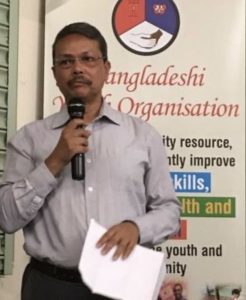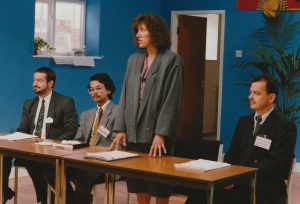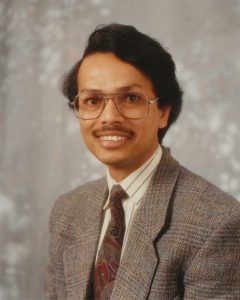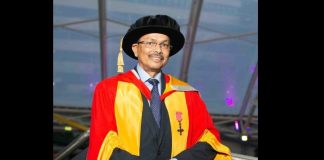A well-known community champion – dubbed affectionately as ‘Mr Manningham’ – has received a prestigious accolade to mark 50 years of community service.
Shaukat Ahmed MBE has been awarded an Honorary Degree of Doctor of the University of Bradford to recognise his significant commitment to the community of Bradford and the university.
Over the decades, Mr Ahmed, 68, has helped to improve the lives of others, by promoting better educational opportunities, enterprise development, and better housing for the most deprived communities of Bradford.
Passionate about his personal motto of ‘let the weakest have the greatest say,’ there’s no doubt about the impact he’s had on the local community.

Shortly after arriving in Bradford from Bangladesh in 1974 to study physics, chemistry, and maths A-Levels at Bradford College, before completing a degree in electronics and electrical engineering, he recognised the lack of facilities for the Bengali youth.
He says: “There wasn’t much for young people to do – nowhere for us to call our own and hang out relaxing to music. There was one Bangladeshi organisation, but it was very much geared around older people and meeting their needs.
“Bengali families tend to be very conservative in their views and the idea of somewhere for boys and girls to mix together chilling out was frowned upon.”
And so, in 1982 he was influential in forming the Bangladeshi Youth Organisation (BYO)

which soon became a valued and respected group for young boys and girls alike.
Today the registered charity offers a wide range of services for children, young people, women and girls and local residents – addressing educational underachievement, health inequalities, training, and unemployment, community cohesion, isolation, and loneliness.
Shaukat, who started his career in the electronics and engineering department at the University of Bradford before becoming a senior project engineer at Leeds City Council where he worked for 32 years told Asian Standard: “It was a great privilege to be able to share in the origins of the BYO and I’m extremely proud to see the success of something I helped set up all those years ago. I was particularly pleased when I recently heard that the group had received the King’s Award for Voluntary Services – the highest recognition in the third sector.”
Even before he left his homeland, Shaukat grew up in a political environment.
He remembers: “My parents were very keen political activists – supporting the liberation of Bangladesh and the right to self-determination.
“I’ve always had an unwritten rule which I hold close to my heart – ‘let the weakest have the greatest say.’ I’d be standing in a meeting and see someone quite shy and staying quiet and would invite him or her to speak. The same goes in real life. People accept what position they’re in and remain quiet. There’s clear room for improvement but they don’t vocalise this. In a dispute between a landlord and a tenant, I’d always support the tenant. In a dispute between owners and workers, I’d always be on the side of the workers.”
With these strong views, it’s not surprising that he quickly became involved in local politics in Bradford.
He says: “In the late 1970s and early 1980s we had a lot of problems with the National Front. They used to march along Manningham Lane and into Cornwall Road where a lot of Bengalis lived. Bengalis are seen as people who are extremely calm and don’t like trouble.
“National Front members would come with their flags and very offensive slogans and our parents would tell us to stay at home and not go out to avoid getting mixed up in any trouble.
“I found this racial discrimination totally unacceptable. We went to the police, but they told us that there were no grounds on which to ban them as there was no breach of the peace and they were simply expressing their right to freedom of speech. The police simply didn’t see that the National Front supporters were seriously hurting our feelings.”
He continues: “Things culminated in 1976. National Front members came to Manningham Lane and were met with resistance from the local community. There were a lot of trade union members who supported us, and I was there from the National Union of Students.
“This resulted in a mini riot with police vehicles overturned and people from both sides being arrested.
“After that, Bradford Council and the police decided it was too risky to let the National Front march along Manningham Lane every Saturday and it was called off.”
Realising there wasn’t enough stock to house large Asian families, Shaukat turned his attention to tackling this issue in the mid-1980s.

He expressed: “Completely against the national trend which saw a ban on creating additional housing stock, we convinced the Housing Corporation and the housing minister to let us form Manningham Housing Association in 1986. There were 15 or 16 of us involved in setting it up and I was the founding chairman.
“We took some actions in Bradford which later became a model for national government for example basing the value of a house on the number of people who lived in it. Large family houses also meant that older people could be looked after by the second or third generation instead of being moved into care homes having to pay costly rates.
“Manningham Housing Association now has around 1,600 properties and is valued at approximately £60 to £70million worth of stock. It’s very humbling to know that I was involved in setting up this important organisation. To go against ministerial policy was certainly one of our finest hours and a great victory for everyone involved.

“Bradford Council was also extremely supportive in releasing brownfield sites in Manningham for development. This means that residents are getting far better houses than they ever dreamed of near the city centre.”
Another of his key roles was founder director and chairman of a community enterprise called Action for Business Ltd, which owns and runs Carlisle Business Centre in Bradford, from 1991 to 2021.
Since his retirement in 2021 Shaukat, who received an MBE in 2008 for his community and voluntary development work, has helped run BEAP Community Partnership which helps unite local communities through a shared experience of songs and music.
Speaking of the honorary doctorate, Shaukat – who has been married to his wife Shanaz for 41 years and is a father of two and a grandfather of four – says: “It means a lot to me. Within my family, there have been six people graduating from the University of Bradford and I’m closely connected to it.
“It’s a great feeling for me personally. I see Bradford as my home city. I came here in 1974 and I’m still here.”
And so where did he pick up the affectionate title ‘Mr Manningham’?!
Shaukat concludes fondly: “The then leader of Bradford council, Councillor Ian Greenwood, used to tease me about my affection and dedication towards Manningham and in a meeting one night said jokingly ‘oh, there he goes again, Mr Manningham. A local reporter was there and printed it and it’s stuck ever since!”
Well it seems Shaukat is certainly deserving of the title, which should now rightly be addressed as Dr Manningham.




